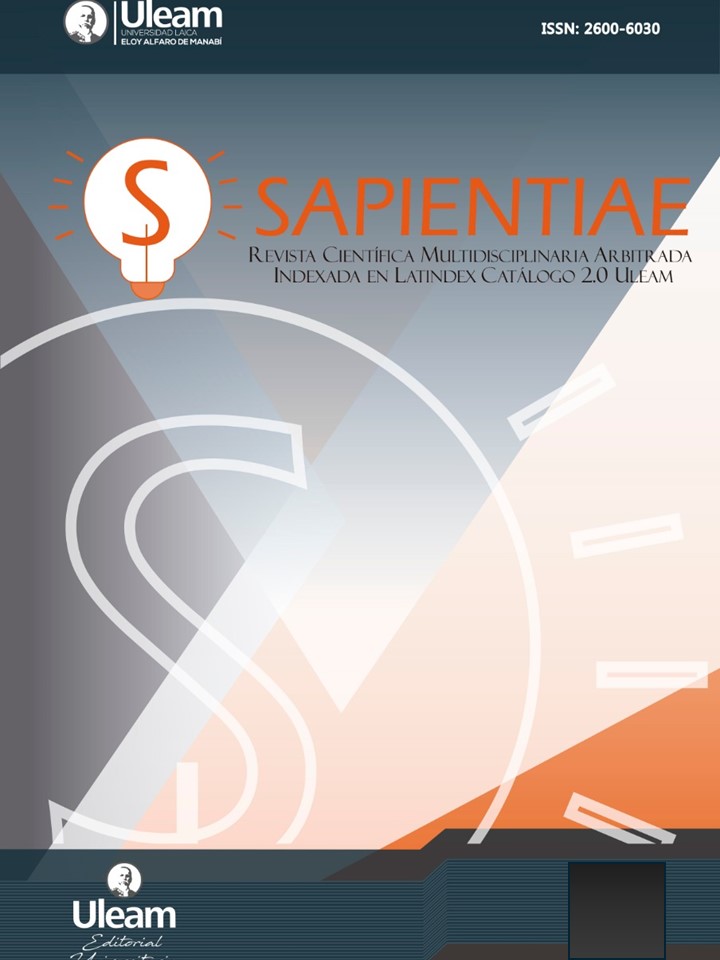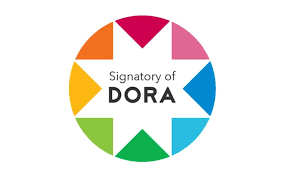Use of Cyber Games in Early Childhood Education in the COVID-19 Context
DOI:
https://doi.org/10.56124/sapientiae.v6i12.0006Keywords:
cyber games, parental control, COVID-19Abstract
The objective of this research is to diagnose the attitude of parents of the Juan Jacobo Rousseau School in the province of Santa Elena, Ecuador, about the benefits that cyber games could generate to develop skills and abilities in children. A 5-point Likert scale was used to address the dimensions a) Knowledge, benefits and risks of the use of cyber games; b) Technology mastery / technological gap; c) time of use / regulations on use and d) types of games, contents and parental control. The analysis was descriptive. Among the most significant results are the knowledge that parents have about cyber games, their risks, but to a lesser extent the benefits; the technological gap between parents and children is not significant, however, they do not present a good disposition to acquire skills or abilities in this type of games to use it at home, likewise; they have control over the types of games, contents and other activities that their children perform. The main conclusions are associated with the parents' perception of the contribution of games in the development of children's skills, which is not totally favorable.
Downloads
References
Anderson, C.; Bushman, B. (2001). Effects of violent video games on aggressive behavior, aggressive cognition, aggressive affect, physiological arousal, and prosocial behavior: A meta-analytic review of the scientific literature. Psychological Science, v. 12, p. 353–359.
Baldeón Loza, S.; Velástegui Villamarín, M.; Heredia Mena, E. (2017). La función del juego en el desarrollo integral de los niños de 2 a 4 años. Estudio desde la perspectiva de los padres del Centro Infantil del Buen Vivir Tierra Nueva. Revista PUCE, n. 105, p. 157-170.
Baptista Lucio, P.; Zimerman, A.; Loeza, A. (2020?. Encuesta Nacional a Docentes ante el COVID-19. Retos para la educación a distancia. Revista Latinoamericana De Estudios Educativos., v. 50(ESPECIAL), p. 41-88.
Blake, C. y Hamrin, V. (2007). Current approaches to the assessment and management of anger and aggression in youth: A review. Journal of Child and Adolescent Psychiatric Nursing, v. 20, p. 209-221.
Cabero Almenara, J. y Ruiz-Palmero, J. (2018). Las Tecnologías de la información y la comunicación para la inclusión: reformulando la brecha digital. IJERI: International Journal of Educational Research and Innovation, n. 09. <https://www.upo.es/revistas/index.php/IJERI/article/view/2665>.
Carbonell, X. . G. E. . B. M. Y. B. A (2009). A bibliometric analysis of the scientific literature on Internet, video games, and cell phone addiction. Journal of The Medical Library Association., n. 97, p. 102–107.
Carolan, P. L. (2020). Families’ Experiences of a Universal Play-based Early Childhood Program in Nova Scotia: Implications for Policy and Practice. Journal of Research in Childhood Education, p. 1-17.
Cedeño Rendon, E.; Vélez López. (2020). Asociación entre el uso de videojuegos, niveles de estrés y ansiedad en adolescentes ecuatorianos en aislamiento por la pandemia COVID-19. [Tesis de grado. Universidad de Guayaquil, Ecuador]. Repositorio institucional de la UG. https://repositorio.ug.edu.ec/items/0ee2628c-8128-4e90-9aa7-9c32cb7ff2f5
del Moral Pérez, M. E., Martínez, L. V., Tosina, R. Y., & Esnaola, G. (2012). Evaluación y diseño de videojuegos: generando objetos de aprendizaje en comunidades de práctica. Revista de Educación a Distancia (RED), (33). <https://revistas.um.es/red/article/view/233131>.
Dorado, S. G. A. (2017). El profesorado español en la creación de de materiales didácticos. Los videojuegos educativos. Digital Education Review, n. 31, p. 176-195. <https://dialnet.unirioja.es/servlet/articulo?codigo=6052467>.
Feijoo, B.; García, A. (2017). El entorno del niño en la cultura digital desde la perspectiva intergeneracional. Aposta Revista de ciencias sociales, n. 72, <http://apostadigital.com/revistav3/hemeroteca/auroragg.pdf>.
García, J. A. (2013). Adicciones tecnológicas: El auge de las redes sociales. Health and Addictions, n. 13, p. 5–13, jun. 2013. <https://www.redalyc.org/pdf/839/83928046001.pdf>.
Ibarra, M. (2019). Participación de los Padres de Familia o Acudientes en el Proceso de Enseñanza Aprendizaje en el Nivel Escolar de los Niños y Niñas de la Institución Educativa Rural Maracaibo Sede Porvenir San Pedro, Municipio de Puerto Caicedo (Putumayo). Universidad del Cauca. Mocoa-Venezuela.
Ihmeideh, F. (2017). Getting parents involved in children’s play: Qatari parents’ perceptions of and engagement with their children’s play. Education, v. 3, n. 13, p. 47-63.
Jácome, N. (2017). El uso de los videojuegos por parte de los estudiantes de cuarto y quinto año de Educación. [Tesis de grado. Universidad Central del Ecuador, Quito, Ecuador]. Repositorio institucional de la UCV. https://scholar.google.es/scholar?hl=es&as_sdt=0%2C5&q=El+uso+de+los+videojuegos+por+parte+de+los+estudiantes+de+cuarto+y+quinto+a%C3%B1o+de+Educaci%C3%B3n&btnG=
Kuss, D. y Griffiths, M. (2016). Internet Gaming Addiction: A Systematic Review of Empirical Research. International Journal of Mental Health and Addiction, v. 10/2, p. 278-296, 2012. <http://dx.doi.org/10.1007/s11469-011-9318-5>.
López, C. (2016). El videojuego como herramienta educativa. Posibilidades y problemáticas acerca de los serious games. Apertura, 8(1), p. 1–15., 2016. <https://www.redalyc.org/pdf/688/68845366010.pdf>.
Núñez-Barriopedro, E.; Ravina-Ripoll, R.; Sanz-Gómez, E. Los videojuegos en la educación: Beneficios y perjuicios. Revista Electrónica Educare, v. 24, n. 2, p. 240-257, 2020.
Paniagua, H. (2018). El impacto de las pantallas: televisión, ordenador y videojuegos. Pediatría Integral, v. XXII, n. 4, p. 178. <https://www.pediatriaintegral.es/wp-content/uploads/ 2018/06/Pediatria-Integral-XXII-4_WEB.pdf>.
Rivera, E.; Torres, V. (2018). Videojuegos y habilidades del pensamiento. RIDE. Revista Iberoamericana para la Investigación y el Desarrollo Educativo., n. 8(16), p. 267-288., <http://www.scielo.org.mx/scielo.php?script=sci_arttext&pid>.
Rodríguez, A. y Martínez, F. (2016). La participación de los padres de familia en el proceso Educativo. Fundación Universitaria Los Libertadores. Colombia.
Ruiz-Palmero, J.; Colomo-Magaña, E.; Sánchez-Rivas, E. (2021). Estudio del uso y consumo de dispositivos móviles en universitarios. Digital Education Review. Techno-addiction among the young, adolescents and children., v. 39, n. 39,
Tejeiro Salguero, R. (2001). La adicción a los videojuegos. Una revisión. Revista Adicciones, v. 13, n. 4. <https://www.adicciones.es/index.php/adicciones/article/view/555>.
Viñals, A.; Cuenca, J. (2016I). El rol del docente en la era digital. Revista Interuniversitaria de Formación del Profesorado, Zaragoza, v. 30, n. 2, <https://www.redalyc.org/jatsRepo/274/27447325008/html/index.html>.
Weinstein, A. y Lejoyeux, M. (2015). New developments on the neurobiological and pharmaco-genetic mechanisms underlying internet and videogame addiction. American Journal on Addictions.
Published
How to Cite
Issue
Section
License
Copyright (c) 2024 Revista Científica Multidisciplinaria SAPIENTIAE. ISSN: 2600-6030.

This work is licensed under a Creative Commons Attribution-NonCommercial-ShareAlike 4.0 International License.


2.jpg)


















